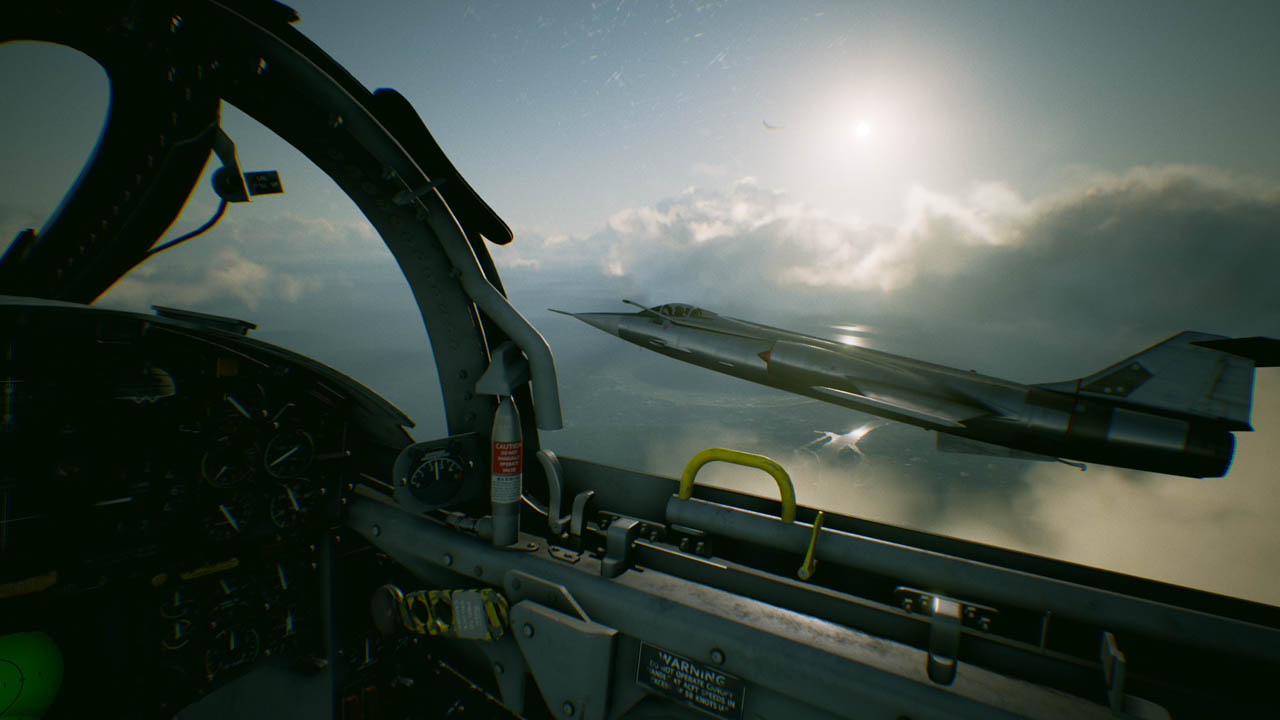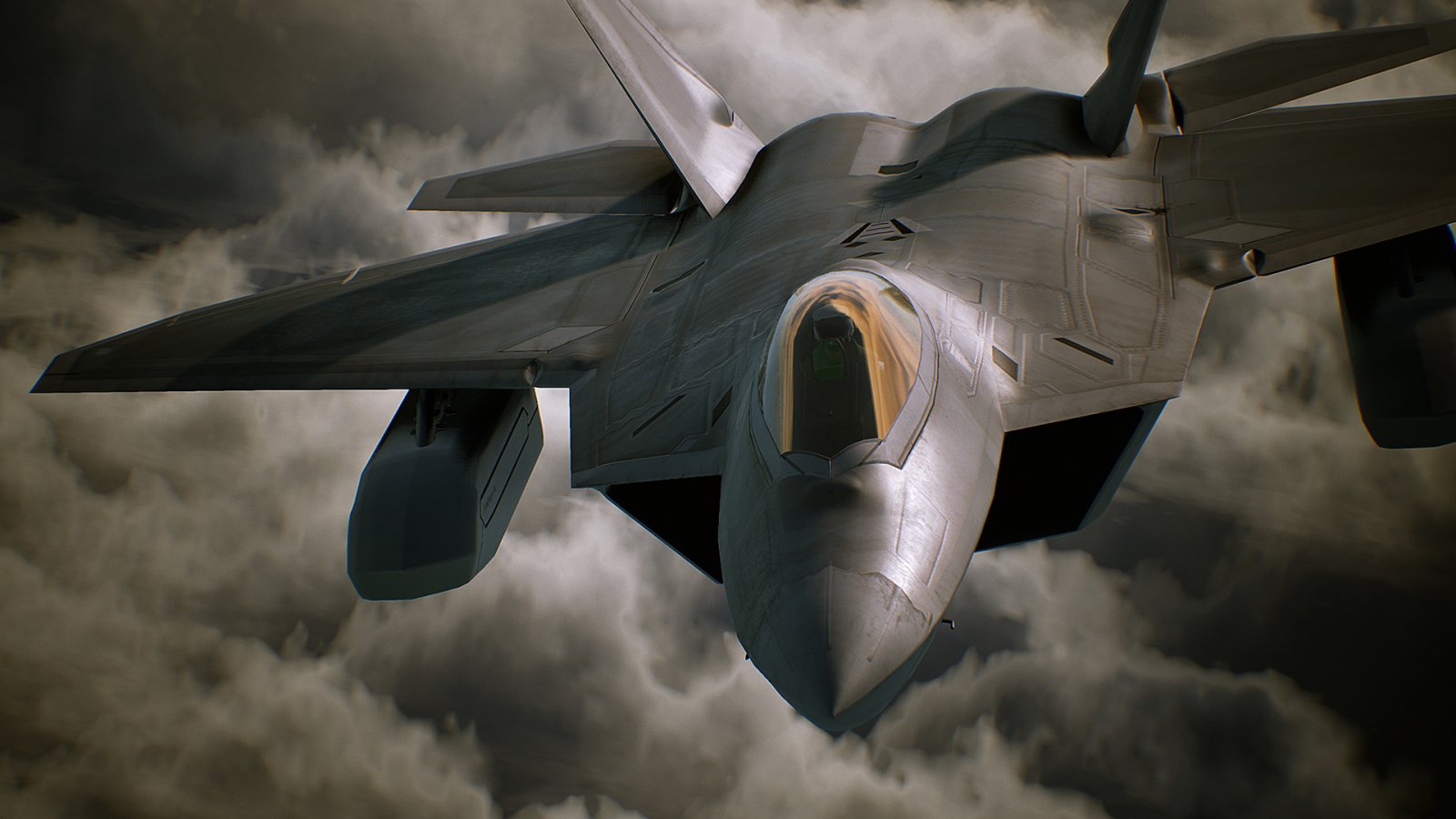Edited by: Tiffany Lillie
One Christmas, my parents dug a game out of the bargain bin to put in my stocking. I had no idea what it was; it had some bland title about airplanes that I’d never heard of before. But I popped it into my PS2 to kill some time in the sleepy, post-present-unwrapping lull of Christmas day. I was surprised to find a game that not only hurled me into level after level of addicting dogfights, but also featured an intriguing plot that was uniquely illustrated by still paintings. It was a poignant story about war, loss, and recovery that was unexpectedly deep from a genre of entertainment usually associated with things like Top Gun. I completed the entire game that day, and Ace Combat 04 (AC04) still ranks as the best Christmas present I’ve ever received.
Now, a few titles later, the franchise has finally been released on PC. I hadn’t played another Ace Combat until now — maybe because I didn’t buy many consoles past the PS2, or maybe because I was afraid it would ruin the sublime experience of AC04 — but when Ace Combat 7: Skies Unknown (AC7) came along, I was ready. As it often goes with that bittersweet emotion called nostalgia, I did feel something of my old childhood joy, but I was also disappointed in some ways.
Ace Combat begins and ends with the plot.

I wouldn’t expect an Ace Combat title to release without some kind of story, and it’s clear AC7 is trying to match the more successful titles in the franchise. A review score for this game could almost focus entirely on the story because of how large a role it has played in the franchise before. Everything else is flying a jet, and after seventeen games(!), it’s safe to say they’ve gotten the mechanics of dogfighting down to an art.
The story feels comfortable and familiar in many ways. The franchise has created its own form of storytelling through cutscenes, mission briefings, and radio conversations while you’re flying. In some ways, it’s very effective. Through the missions and cutscenes, Ace Combat has always managed to build up the main ace pilots in each episode to legendary status, and it always makes for a satisfying showdown when you finally face them in battle.
But in other ways, the form is becoming a little stale and limited. AC04 managed to tell an emotionally complex tale in about half an hour of cutscenes. By AC5, this time was doubled. That’s not necessarily a bad thing; many people say AC5 is the best in the series. But by AC7, parts of the story have become long and tedious. It’s scattered into several hard-to-follow storylines and delivered by less-than-stellar voice actors. But this can’t be said about the entire experience, since it’s pretty inconsistent. Sometimes there are no cutscenes and very little said in mission briefings, but at other times it feels like you need to clear your whole schedule to finish listening to everyone talk.
The plot itself is interesting and full of twists — you play as a pilot who makes a huge mistake in an early mission and you’re sent to a military prison. As war breaks out, the military starts sending you and your fellow prisoners on missions, where you quickly become a legend. The war itself centers around the world’s first space elevator, and your enemy battles with an army of drones programmed to dogfight like the aging hero of a previous war. Packed in here are double-sided sentiments, like technology’s potential as the hope of humanity or as our greatest vice. Framed like this, the old war hero whose body can no longer withstand a dogfight, but who is given the chance to fly again by controlling drones, is all the more tragic because the machines that are programmed using his fighting style send the world into chaos and threaten to clip humanity’s wings, all because he couldn’t stand the thought of not flying. When laid out like that, the story sounds emotionally rich and gripping. But unfortunately, several things manage to throw sticks into the spokes of this otherwise incredible plot.
This franchise is somewhat haunted by its own past.
AC7 opens with an edgy aircraft mechanic that calls herself the Scrap Queen because she fixes up old fighter jets to drag race. Queen is a little too edgy in the English version (maybe something was lost in translation), but she’s an otherwise interesting and exciting character. So interesting, in fact, that I couldn’t wait to play as the adrenaline-seeking, trash-talking Scrap Queen.
But then the first mission opens and you’re just some dude named Trigger. Yep, they built a character with great potential and a fresh point of view (if only for the fact that she’s a female mechanic who races fighter jets) and you’re forced to play as the same silent protagonist bro you’ve been playing in every game for the past two or three decades.

The reason behind this seems to be that AC7 is trying to capture the success of their past, only to make that formula into a cage for the franchise. In AC04, the success of the plot is rooted in the fact that the cutscenes tell a different story than the gameplay to make a point about war. The main character is the ace pilot you play as, but the narrator in the cutscenes tells the story of a fighter he calls Yellow 13. In the end, Yellow 13’s story is revealed to be a mirror of the player character’s story, as you face Yellow 13 in battle, and the relative insignificance of his death actually makes you reflect on what it all means. Impressive for a flight simulator!
Following this successful formula, AC7 tried again to make Scrap Queen a sort of indirect narrator. Her story runs parallel to yours and she is therefore telling your story from an outside point of view. But where this technique was used in Yellow 13’s story to question ideas like heroism and nationalism in a world where the names of the countries are basically interchangeable, the latest installment only manages to push a dynamic character to the side in order to serve the story of Faceless Protagonist Bro.
Other areas where the past seems to be holding AC7 back.
AC7’s menus and upgrade systems seem to be from a time when green grid lines and blinking computer cursors told us that we were dealing with serious, high-tech military equipment. These days, the motif just makes things hard to read and navigate (but even this can’t explain why the upgrade tree is so dimly lit that you have to squint to see it). This same idea applies to the briefings, which maintain the old format of a disembodied voice over a map that seems to have as much detail (or as little) as the earliest games in the series. This style can be confusing, to say the least, and seems to be propagated from past technological limitations. Graphics have improved; it should be okay to actually show a man talking, or at least a map that’s actually useful.
The gameplay is much more impressive. There are many levels featuring beautiful natural features, such as mountains, sandstorms, and clouds — but the flight simulation genre as a whole seems to struggle to justify the latest generation of graphics hardware. AC7 runs great on PC, and the third-person view of your jet is a great default choice for eye candy, but you’re often too far away from anything to make out any detail. The exception is when colossal structures and aircraft are featured, but AC7 seems to have much less of these than earlier games. On the other hand, this title seems to be moving in the right direction, with maps that have towering, narrow cliffs and updrafts of air that affect your flight. Being struck by lightning and watching your HUD flicker is the kind of immersive experience that I enjoyed and would like to see more of in the future.
The wasted potential is a little disappointing.

In other words, we already know Bandai Namco can remake a classic Ace Combat, but what’s new? AC7 could have ditched some of these old problems and modernized the genre, but instead they decided to revisit what made the franchise great in the first place. I can’t say I’m disappointed by that — it does fulfill my nostalgia and makes me want to buy an old PS2 to play AC04 and AC5. But at the same time, there is so much wasted potential.
Part of this may be the language barrier. It’s difficult to find out if the English story was translated directly from the Japanese version or what the case is, but it definitely feels like a carefully-crafted story that has lost its luster in the translation process. Some things aren’t very well written; like I said, Scrap Queen is a little too edgy, and there are character developments that are jammed into a single thirty-second space between missions. The acting isn’t great, where in previous titles it was pretty well polished (based on the scenes I’ve been watching to brush up on lore). And the English in the menus seems strange, as if it’s all hastily-written text based on the Japanese version. But those are all assumptions. If AC7 was written in English first, it makes these rough edges all the more awkward.
In the end, this is an Ace Combat game to its core, and Ace Combat games are generally pretty great. They’re addictive, they make you feel like a hero, and they try to make you think about things like human nature. I can appreciate that, and I can only hope the next installment really pushes the envelope for the genre. (Get it? Cause “push the envelope” is an aviation expression. Okay, sorry, I just had to fit that in somewhere.)
The Verdict: Great
Ace Combat 7 does scratch the nostalgic itch for this classic franchise, but it gets a little too caught up in its own past. Old menu interfaces, storytelling techniques, and outdated mechanics still linger in this title, weighing it down. While it follows a formula that’s solid all around, there’s nothing that really sets this installment apart from its predecessors. It’s just a solid Ace Combat game that holds no surprises.


